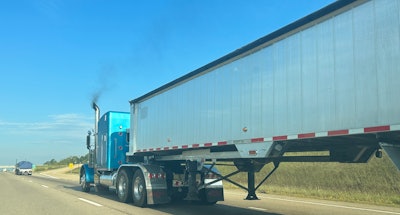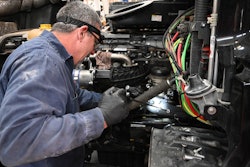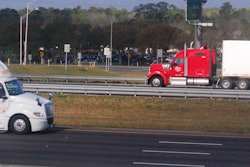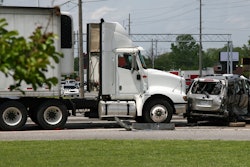
Owner-operators and fleet owners who operate in California can now register their vehicles in a new California Air Resources Board system before the state implements a new “smog check” requirements on most trucks twice a year.
The new Clean Truck Check program was approved by CARB in December 2021 to replace the state's current Periodic Smoke Inspection Program (PSIP), from which most independent owner-operators were exempt.
Clean Truck Check requires non-gasoline (diesel, alternative fuel, and hybrid) trucks, buses, and other heavy-duty vehicles (such as California-registered motorhomes) with a gross vehicle weight rating over 14,000 pounds to undergo emissions testing if they operate in California. Clean Truck Check applies to most large vehicles that operate in California, regardless of the state in which they're plated. The purpose of the program is to ensure all emissions-related equipment is functioning properly for the life of the vehicle.
The Clean Truck Check Program does not apply to:
- Zero-tailpipe-emission trucks
- Military tactical vehicles
- Authorized emergency vehicles
- Motorhomes registered outside of California
- Vehicles operating under an experimental permit
- Historical vehicles
- Gasoline vehicles
[Related: CARB approves ‘smog check’ regulation for trucks operating in California]
By Dec. 31, trucks operating in California must be reported to the Clean Truck Check Database, and an annual $30 per vehicle compliance fee must also be paid.

CARB noted that the Clean Truck Check Database is a separate registration system from other CARB systems, such as the Truck Regulation Upload, Compliance and Reporting System (TRUCRS). A new account will need to be created to report owner information and vehicle information for all vehicles operating in California. For truckers already registered in TRUCRS, owners' vehicle information can be downloaded from TRUCRS and then uploaded to the Clean Truck Check Database to allow for a more convenient reporting method. Changes to the fleet operating in California (adding or deleting a vehicle) must be reported within 30 days of the action.
CARB said that as of January 2023, Roadside Emissions Monitoring Devices (REMD) have been used throughout California to screen for potential high-emissions vehicles. Once this new program is fully implemented, owners identified as potential high emitters will be issued a Notice to Submit to Testing (NST) letter and will have 30 days to submit a passing emissions test to CARB. Failure to submit a passing test may result in an enforcement violation. Enforcement staff are also conducting random roadside inspections now to verify compliance.
[Related: California banning diesel truck sales in 2036]
Under the program, trucks equipped with 2013 and newer model-year engines with on-board diagnostics (OBD) will be need to submit an emissions test twice a year, with that number increasing to four times a year after three years. The tests on these trucks will be conducted by a telematics device that meets CARB’s data format submission requirements, or hand-held scan tools and plug-in dongles that meet CARB’s data submission requirements.
Pre-2013 model-year engines without OBDs will be required to submit an opacity test and a visual/functional inspection twice a year. The opacity test must be up to the SAE J-1667 opacity standard. Alternative-fuel trucks are exempt from the opacity test. The visual/functional inspection must be performed by a credentialed tester and is meant to check for tampering of the emissions system.
Passing tests will be required to be submitted within 90 days before compliance test deadlines. For trucks registered in California, the deadline is based on the truck’s DMV registration date. For example, if the truck’s DMV registration date is March 31, then its periodic submission deadlines would be March 31 and September 30 (6 months later) for a given year.
Trucks registered outside of California will have deadlines based on the last number of the truck’s VIN.
 For example, a VIN ending in "5" has a compliance deadline of March 31 and a second compliance deadline on September 30 (6 months later).
For example, a VIN ending in "5" has a compliance deadline of March 31 and a second compliance deadline on September 30 (6 months later).
CARB estimates that periodic testing requirements will start in July 2024, meaning that a passing compliance test would be required to be submitted to CARB for vehicles with compliance deadlines on or after July 1, 2024.
The requirements of the new program also extend beyond truck owners. Freight contractors and brokers must check for compliance documents and retain records. As has been the case for large warehouse operators under parts of CARB's new rules with respect to meeting mandates for ZEV use, seaport facilities and intermodal railyards must check that only compliant vehicles enter/operate on their properties or maintain records of non-compliant vehicles entering or operating on their properties.
[Related: CTA's Shimoda: Start working on CARB regulation requirements now]










